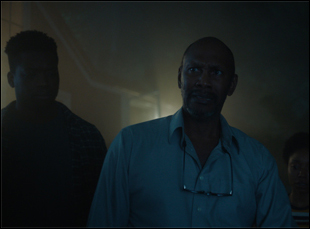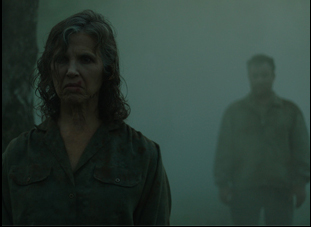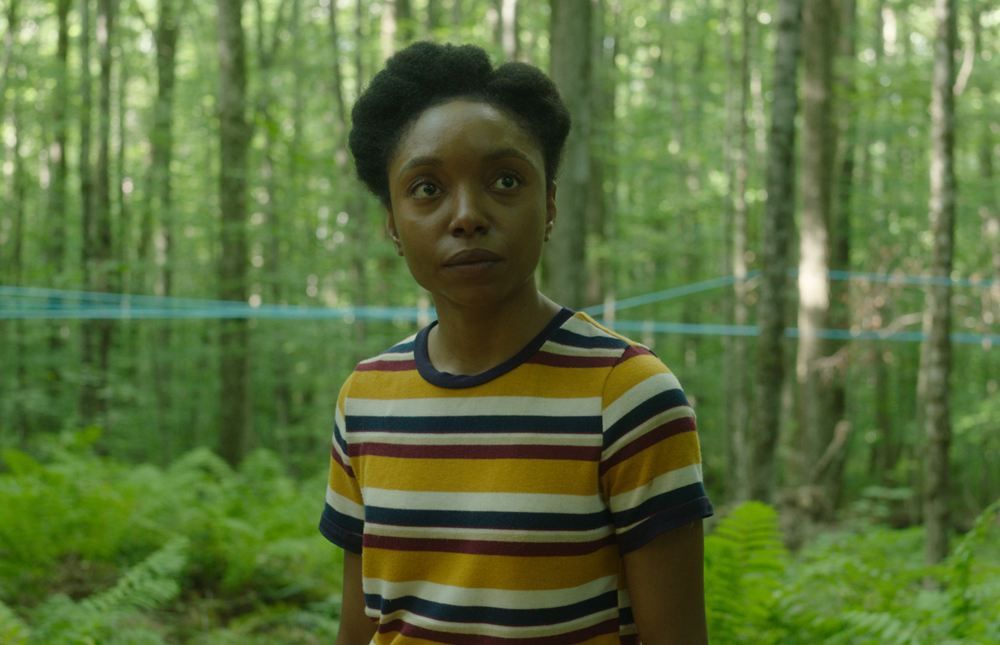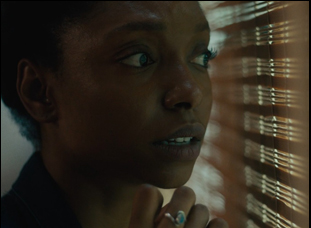“Simple black frame, nothing expensive,” Jeffrey (Ron Brice) tells his daughter Norra (Victoria Villier) about how she should present the deed he’s bestowed to her and her brother Tucker (DeLeon Dallas) in “Inheritance,” underselling the value of the piece of paper. The birthday gift is somewhat of a formality when they’ve shared a beautiful house in the woods of Vermont for some time, but for all the work they’ve put into it, harvesting the surrounding maple trees for syrup and making a home for themselves over years, it can still feel as if the property isn’t theirs when they are all too conscious of being among the few African-Americans in a predominantly white community, a free-floating anxiety that begins to manifest itself physically in Annalise Lockhart’s ingenious thriller.
A first assistant director on such features as “The Fits” and “Chained for Life,” Lockhart’s debut short calling the shots reveals an assured hand with potentially thorny material as the family at its center is visited upon by zombie-like spirits that would seem to challenge their right to the land. While it takes some time for Norra, Jeffrey and Tucker to comprehend what they’re seeing, it may be more unbelievable what the writer/director is able to do in just 14 minutes to create a convincing sci-fi-tinged drama in which Tucker comes up with a novel solution to keep the family safe, drawing what power he can from the environment around them. Lockhart effectively does the same, immersing audiences in a forest full of possibilities and showing the ingenuity and strength of a family that works together to ensure their survival in an unkind world.
After premiering at the Atlanta Film Festival en route to stops at RiverRun and the Palm Springs ShortFest, where it made its west coast theatrical debut this weekend, Lockhart generously took the time to talk about “Inheritance” and shooting at her own family’s home in Vermont, as well as the vast amount of knowledge she now has regarding trees and her equally impressive command over the small, enlivening technical details that make the film truly electric.
The first seed of the film was when I was talking to somebody about the stereotype that black people don’t camp, and I [thought], “All stereotypes come from somewhere,” so the original idea was how cool would it be if there was a camp site that when you go into it, you become invisible. Often black and brown people are seen as intruders in those spaces whereas white people can just seem like they’re part of the scenery — they aren’t asked why they’re there or bothered in any way, so they just get that true sense of peace and tranquility.
And the house where we filmed is actually my mom and her brother’s house in Vermont, so we actually shot at a house my family owns and [as] I was thinking about this idea of invisibility and camouflaging in nature, controlling when we’re seen and when we aren’t, [I] also wanted to talk about ideas around home ownership, which is something that while I was writing this is something I was really interested in – the ways we preserve legacy and ideas around intergenerational wealth.
I rushed to my computer after seeing this when I learned something new – did you know from the start that trees could produce electricity?
I wasn’t sure. [laughs] I didn’t want to say that without looking it up, but I had a friend who did this project where they attached electrodes to plants and if you touched a plant, it gives a different tone frequency, so I knew there was something there. The maple tapping lines are visually really striking in that area and most people who don’t live in the Northeast or Canada don’t know what it is, but [as I was thinking of the story] I knew I wanted them to become invisible and I knew that trees produce sap and there’s energy flowing that way, so I started reading a lot about trees. I came up with a lot more information on them than I could fit in the film, but the electricity part is super cool and now we know that the root structure of trees redirect nutrients to other trees. I’m a huge geek about that and my brother, who’s a climate scientist, read the script and he was like, “I want to talk about trees a little bit more.” [laughs]
Obviously you knew the location, so what was it like to design the film around this house. I loved how the light hits it in a different way throughout.
Yeah, Charlotte Hornsby, the cinematographer, is a close friend of mine and we had been looking for a project to work on together for a while. It was such a gift to have her as my partner because we went up to the house together to scout it at least a couple other times and we were able to photograph the interiors and exteriors at many different times of day so we could precisely pick when the light looked the best and see everything from every angle. The outside is initially super-inviting, but its character changes a lot, and the house is actually on a street, but the way we framed it, every time you’re seeing the house, it’s completely surrounded by trees, so we denied the road completely to create that effect that at times they’re enveloped by the forest in a loving way and then at other times suffocated by it. It was the same with the inside of the house, [where in] the beginning, it’s warm, the fire is roaring, everything’s good and then the mood really shifts.

That’s actually one of my favorite scenes too. We found that part of the sugar house because we thought what would they be doing in the summer. That is actually the tank where the sap is collected and that sugar house is totally run on solar, so it’s all done on gravity and it collects there and…I could talk about that for a while too. [laughs] But in that scene initially, I had more dialogue planned where it was more the two [characters] talking together, and while we were shooting it, I [realized] it makes way more sense that her friend would be talking at her, but she’s not able to respond [because] she’s so in her head, and in that moment, I was also trying to convey the psychological dread that she’s experiencing — it’s not something everyone’s experiencing, it’s confined to this family alone — so [I wanted] to have her friend be so oblivious to her emotional state. The woman who plays her co-worker friend I also work with a lot, so I had a little bit of a bad feeling [telling her], “You’re mostly going to be out of focus and we’re not going to be able to hear you.” [laughs]
It was a really effective scene. How did you end up finding your cast for this?
We did a casting notice through Backstage and the traditional places and I was super lucky to find Ron [Brice], who plays the dad, and Victoria [Villier], who are both just incredible, and DeLeon [Dallas] was through a friend of a friend. Through the casting process, I just wanted them to seem like a real family because sometimes you’ll have actors that are individually really strong but don’t feel like a family and for this story especially, you really have to believe that their bond is really strong because you need to understand that the house is worth protecting and worth sticking their feet in the ground a little bit to save. Without that family bond between those actors, it would’ve fallen apart. This is a small thing, but when they’re cleaning up after dinner and they’re singing, that was just them. Initially, I was like you should talk a little bit to get the shot going [because] it was a dolly shot and I can’t just start on them doing nothing, but they just came up with that on the spot and ad-libbed that song, so I’m like we’re going to keep that in there.
And it was a really great cast for my first short because they were all kind and super-supportive. Ron, who has been acting for decades, [said I] was the first woman director he’d ever worked with and he was super-excited about that and it was hard at times putting them through [some of this], especially Victoria, when she’s in the woodshed and she sees the woman hiding, putting her into these emotionally really tough situations and making her go there, but we supported each other through that. Everybody was really aware of the sensitivity of the content, so there was a lot of talking [for instance] between Bob [Gallagher] and De Leon, where it’s like, “We’re adversaries. How are we doing this?”

That was definitely tough. In that scene when she’s walking through the woodshed, she’s following the steadicam, so she’s walking towards a bunch of people who then have to cramp into the corner, and there’s like a dance there, so big props to them for pulling that off. In terms of the visual effects, we did a lot of things practically and I think that makes it a lot stronger too because they’re playing off something that’s real. Having the actors that played the ghosts Kathryn [Graham Howell] and Bob were really great and really committed to embodying those characters, which is great because they don’t speak. And there were a lot of mosquitos because it was August, so there’s one scene where Bob winks both of his eyes because the bugs were attracted to his makeup, so we tried to get through it really quickly.
In general, how did you gravitate towards filmmaking? I’ve heard your dad is a playwright.
Yeah, my dad wrote plays and it is really great to have a parent who supported a career in the arts and knew it was a viable profession because I think I have a lot of friends who needed to convince their families it was a worthy pursuit that would sustain them. I never had that problem, which was such a gift, but I knew that I wanted to go into film and part of that was also my love of music and sound. At one point in college, I thought maybe I’m going to be a sound engineer and I took a bunch of courses in that as well because in the theater, there’s always tons of overlap between the two.
It’s definitely such a great part of “Inheritance.” What was it like to work on?
My friend Evan Gitterman did the music and he’s also a sound engineer at Dolby. We went to college together and I’m a huge fan of his. It was just so fun working with a composer and being like, “I want the scene to feel like this. I want dread here” and then going into the catalog and looking at a lot of science-fiction scores that I really loved. In Ron’s monologue where a theme comes in, that is quoted [a little] earlier in the film where Tucker is explaining what the contraption does, it’s this hopeful theme was really inspired by Vangelis and the “Blade Runner” score, so we definitely nerded out and put lots of little touches in there. [Evan] used completely analog synths and we definitely wanted to keep that vintage sound, even though it’s minimalist in there.
The contraption itself, Chris [Foster], the sound designer and I worked on that together, and I wanted to reference the fact that the tubes were intended to have sap running through them, so the sound does have gurgly water elements in it as well as electricity. Chris actually tuned it to the score when they happen at the same time, so we had so much fun with that. People always say sound is so important and it really is, especially helping create the tension in scenes where there is no dialogue and a lot is happening in a character’s head. It’s so crucial.
What’s it like starting to get it out into the world?
It’s been really great. We shot in August of 2019, and we had at least some special effects and I worked with the composer for a while and then obviously, the pandemic slowed everything down. Even when you do something in post, you can’t expect people to work through everything that was going on, but it’s been really great to have people see it. I’m actually going to see it in a theater for the first time at the Palm Springs Shortsfest and I went last night [before the premiere] and saw some amazing films and the crowd was really interacting with it a lot because they were all horror-adjacent movies. The crowd was like, “’Oh no. Don’t do that.’ Or ‘Aw geez,’” like audibly talking, which I loved, so we’ll see.
“Inheritance” is screening at the Palm Springs ShortFest in the Beneath the Surface program through June 28th. It will next screen at Blackstar as part of the Shorts Program: Physiography on August 5th at 4 pm EST, available virtually.





